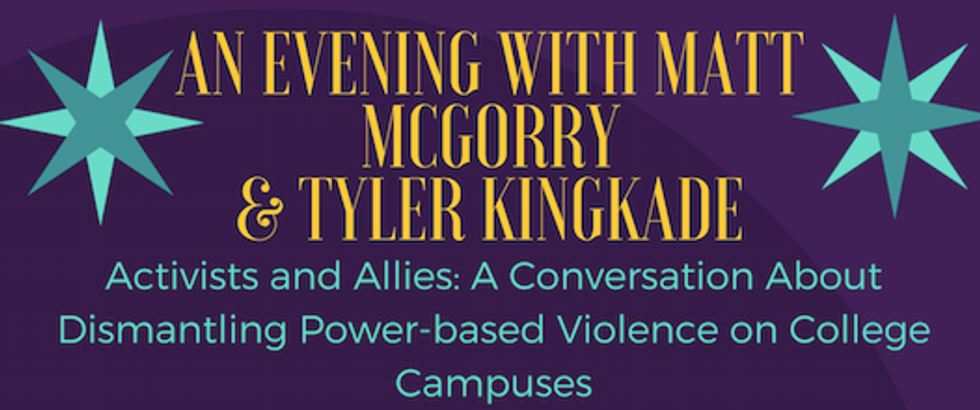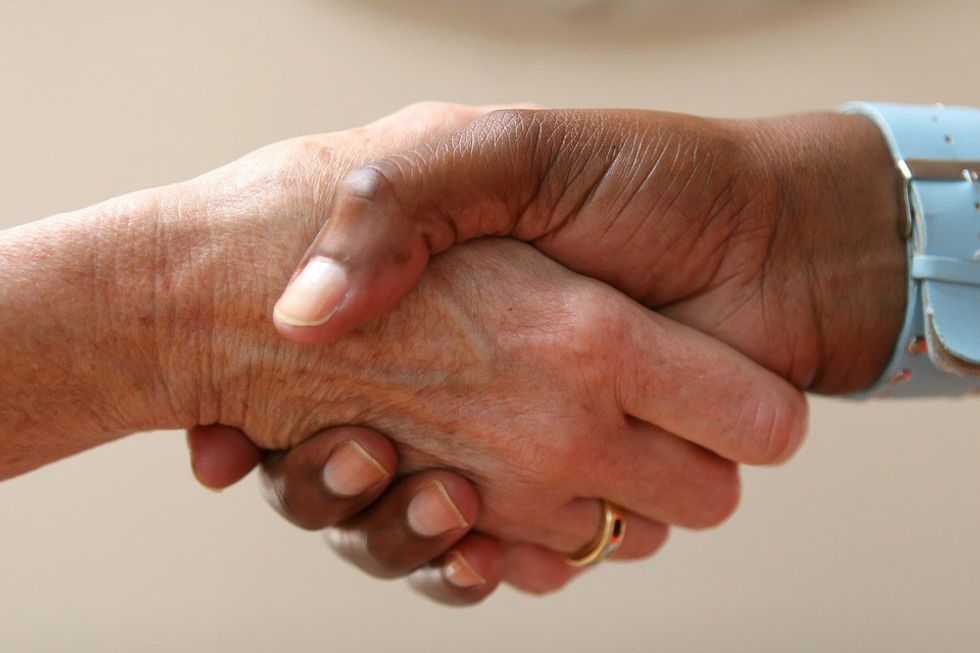Matt McGorry and Tyler Kingkade, one an actor and Emerson alum (McGorry) and one a Buzzfeed writer and journalist (Kingkade), spoke at my college this past week about being allies to fight power-based violence on college campuses. They both expressed that Emerson had given them the warmest welcome yet, situating them inside our beautiful Cutler Majestic Theater, and we Emersonians cheered, pleased and eager to hear what they had to say. We were perhaps a little skeptical, given that these were two white men who were going to tell us about deconstructing power-based violence, but it was quite the valuable experience.
Both Kingkade and McGorry, joined by class of '17 student Emily Solomon and Nina Sennott, the Health & Wellness Manager at YW Boston, discussed their positions as allies and activists in the movement to end racism, sexism, sexual assault and rape on college campuses. McGorry self-identifies as an intersectional feminist, and Kingkade writes about healthy expression of masculinity, sexual assault, violence against women and harassment. They recognized their positions of privilege as white men, stating how they previously had no idea about the scope of the harassment and mistreatment that women, and especially women of color, experience on a daily basis.
McGorry expressed how until he realized how much women and POC go through in this society on macro and micro levels, until he began speaking out about feminist issues and social justice issues, women in his life didn't come to him with accounts of sexual assault, rape and violence. Once he spoke up and showed that he understood these issues, women felt comfortable telling him about these experiences. Women he had never thought had any issues suddenly had stories to share, and his relationships with them improved and deepened. McGorry is confident that given the information of what oppressed groups face, people would not stay silent and would become allies. But how do we get those who deny the problem to listen?
This is where allies come in. McGorry explained how there's a vast amount of discomfort in discovering these issues as someone who is part of the group which is generating and perpetuating the oppression. But we must look past this discomfort and start these conversations. For him, this means talking to other men, even close friends, about their treatment of women. For me, it means talking to other white people about their treatment of minorities and racial issues at large, sharing those voices. As allies, we have to try not to prompt defensiveness. McGorry said that his distance from women's issues, as a man, gives him the ability to be a bridge between those affected and those not affected, that he can remain calm and knows where the other side is coming from, so he can explain in a way that defuses arguments. That way, those affected do not have to play this role and can be angry and upset, as they should be, over instances of racism and sexism.
Allies also are good bystanders. They addressed a hypothetical situation in which a man is in a bar and sees another man behaving in a questionable way toward a woman who is alone and just trying to get a drink. Instead of turning the other way, Kingkade said, "I would just start moving my body between them." He continued that "you don't even have to talk to the woman," emphasizing the ease at which any man can do this and use their presence to deter a male with malicious intent. This applies to all allies. Stepping in when you see sexism, violence toward women (or the signs of it) and racism.
Kingkade himself, in his writing about sexual assault, sought out victims who had already put themselves and their stories out there. He interviewed them, and as he was writing his questions, he recognized the possibility that one might sound as if it were blaming the victim. Kingkade didn't want that to happen, so he did something that I took as perhaps the best advice for allies I had heard thus far. He started off each interview by telling them he had no idea what their experience was like, and so could they tell him about it? This is how he got the most eye-opening and valuable information. He learned that many victims felt that the way schools treated them after the assault was worse than the assault itself, he learned about the various goals in reporting (to get counseling, to charge the assailant) and how not every victim wants the same outcome from reporting. He only got this information by admitting he didn't know what it was like, he left the door open for them to share whatever they felt comfortable sharing. "The best advice I could give myself," Kingkade concluded, "was to shut up. And listen."
And this is how allies overcome perhaps the most pressing issue: overstepping and overspeaking, speaking for minorities and instead of along with them, overshadowing their voices instead of echoing them. McGorry explained this is a process of constant negotiation. The voice of allies can easily dominate the space that should be instead occupied by the voices of those oppressed, so a balance must be achieved. Both of them agree that listening is imperative. Be open-minded and receptive, look past discomfort, and don't speak over others, raise the volume on those silenced voices instead.
"If women didn't have to have these derailing experiences," Kingkade mused to the crowd toward the end of the talk, "then what would that be like, if everyone could operate at their full potential?"
Well, it would definitely be worth the effort.























